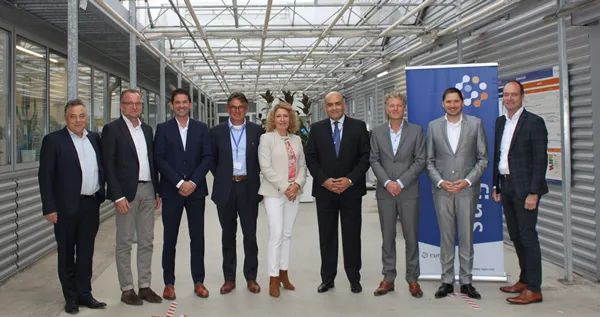Innovative technology in the field of soil research can play a key role in developing the cultivation of fruits and vegetables in Egypt. Egypt is already a major exporter to the Middle East and Europe, and improving current agricultural and horticultural methods could further strengthen the country's leading role in the region.
The Ambassador of the Arab Republic of Egypt in the Netherlands, Mr Hatem Elsayed Mohamed Kamaleldin, recently paid a visit to Eurofins Agro, in Wageningen. As an international laboratory, Eurofins Agro offers farmers and growers worldwide a wide range of soil and crop research. The analyses and advice of Eurofins Agro have now become an international standard for soil fertility, carbon sequestration and crop health.
Thanks to innovative NIR techniques, soil analyses can be carried out locally anywhere in the world. This is an efficient method because it makes it unnecessary to transport (heavy) soil samples to the Netherlands.

From left to right: Han van de Goor (Eurofins), Erikjan van Huet Lindeman (Eurofins), Jos Hooijer (Eurofins), Peter Prins (Land, Water, Food), Rosmarijn Fens (NABC), Hatem Elsayed Mohamed Kamaleldin (Ambassador of Egypt), Arjan Reijneveld (Eurofins), Joris van Benthum (Eurofins), Marc de Kort (Eurofins)
Agriculture and horticulture in Egypt face major challenges due to limited water resources and the salinization of agricultural land. Shortage of good water puts severe pressure on the yields and performance of farmers and gardeners. A responsible use of inputs, such as organic fertilizers, will contribute to achieving higher yields and generating better incomes for local farmers and gardeners. Insight into the condition of the soil is indispensable for this.
Reliable, affordable and rapid soil testing
Recent findings by Eurofins Agro, together with Peter Prins (Land Water Food Consult) and Rosmarijn Fens (NABC), have confirmed the need for reliable, affordable and rapid soil testing in Egypt. Eurofins Agro developed a soil testing method based on Near Infrared Spectroscopy (NIR) in 2004. Since then, more than 1 million soil samples have already been analyzed. NIR makes it possible to analyze samples locally. The analysis results are then linked to a database in Wageningen. A practical fertilization recommendation follows from this. This efficient technology was applied to soil samples taken in the governorates of Sharkia or Beni Suef, among other places.
Future collaboration
The ambassador visited Eurofins Agro to learn more about soil research and its use to optimize agricultural production. He showed great interested and stated that "Egypt is currently building 20 new cities in the desert. Around these cities we will need green areas. To achieve this, we need better soil and more production. The techniques I have seen today will certainly take us a big step in that direction."
The meeting with the ambassador will promote future cooperation between Eurofins Agro and Egyptian partners. Eurofins Agro is a partner in a Dutch-Egyptian consortium that is currently offering training to Egyptian experts who provide advice to farmers within the framework of the Dutch NUFFIC program "Water matters in Egyptian agriculture".
For more information:
Eurofins Agro
088 876 1010
www.eurofins-agro.com
